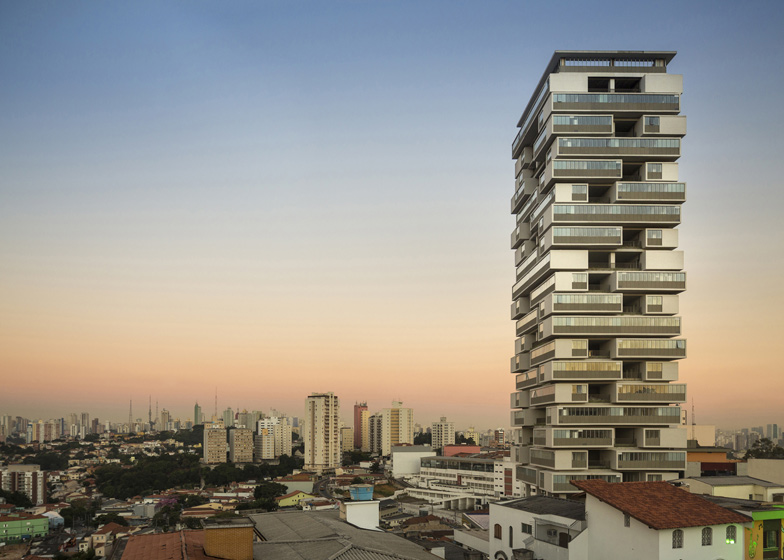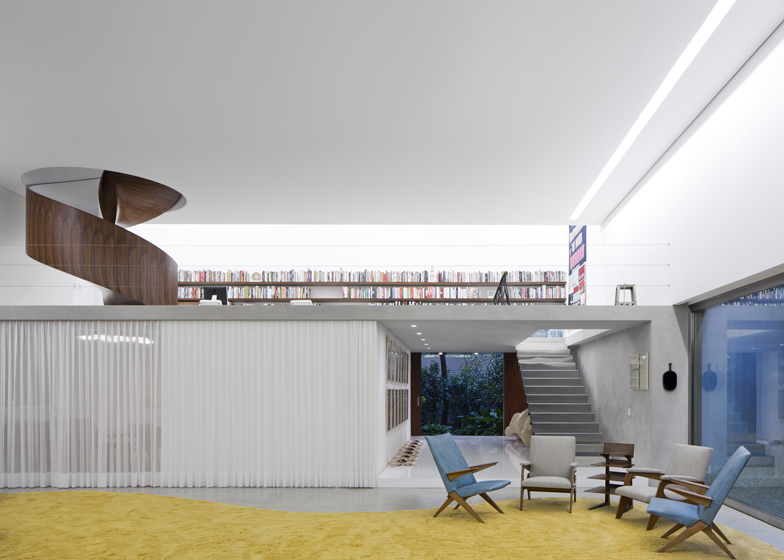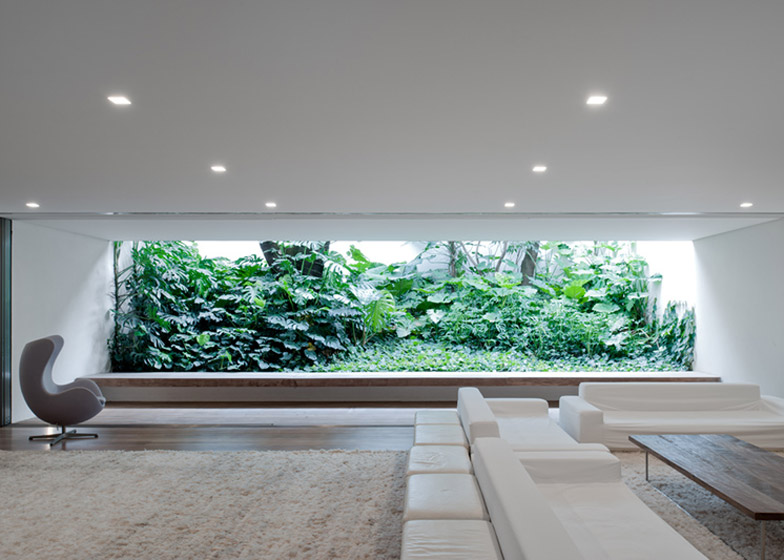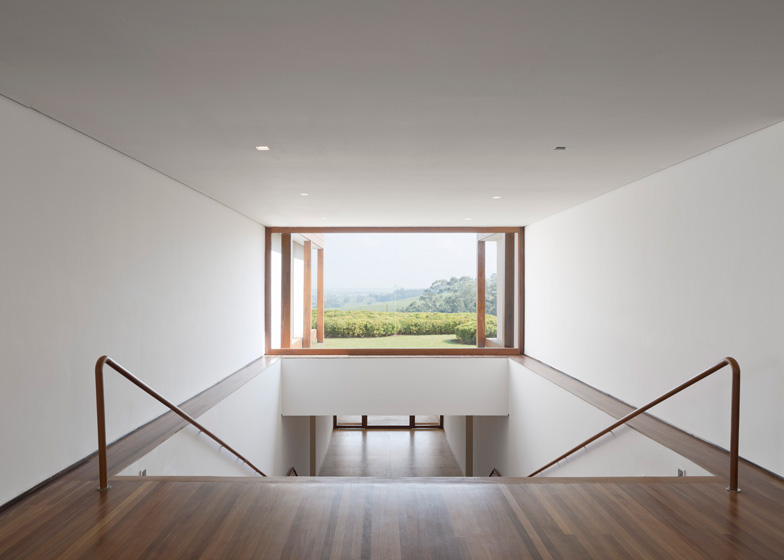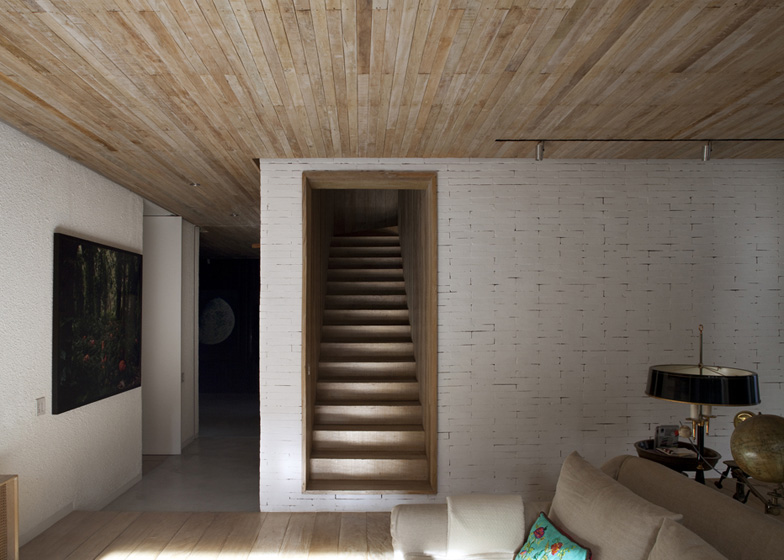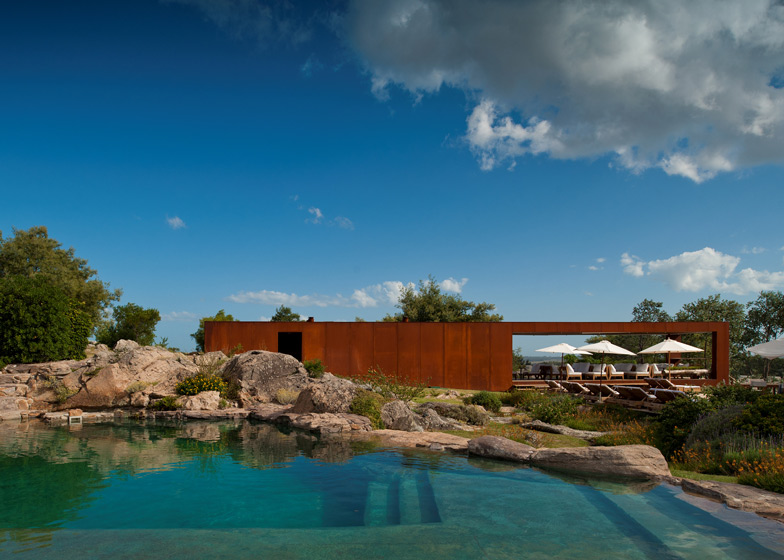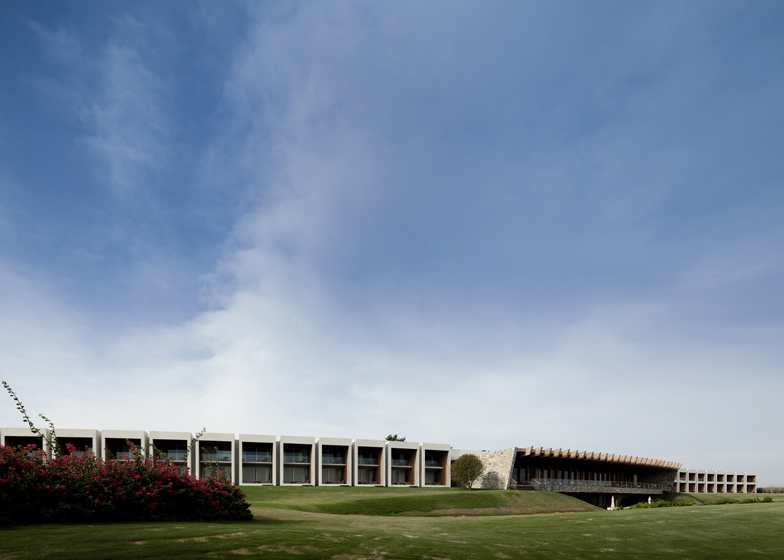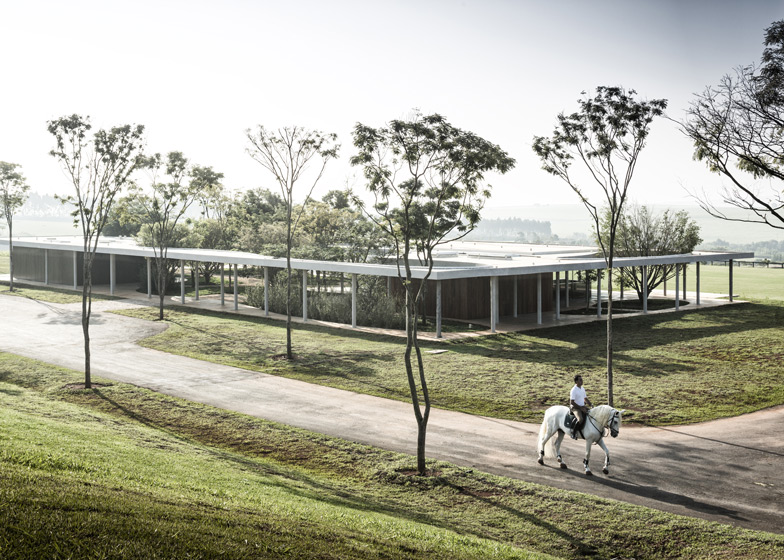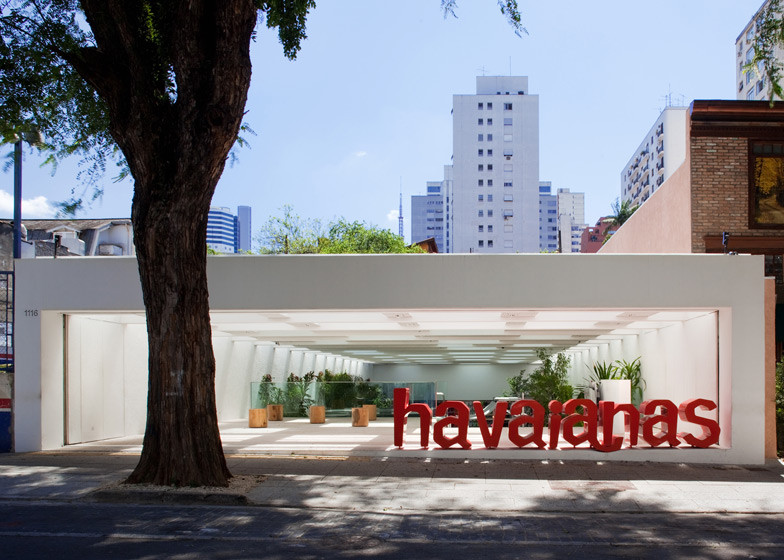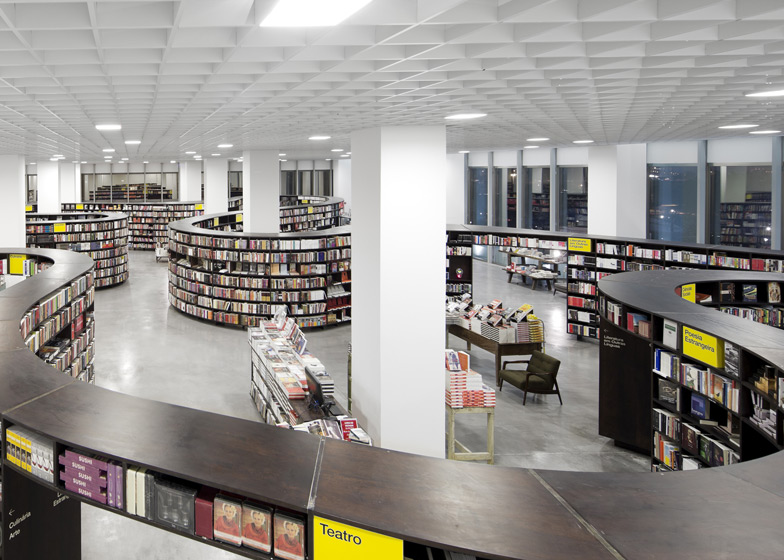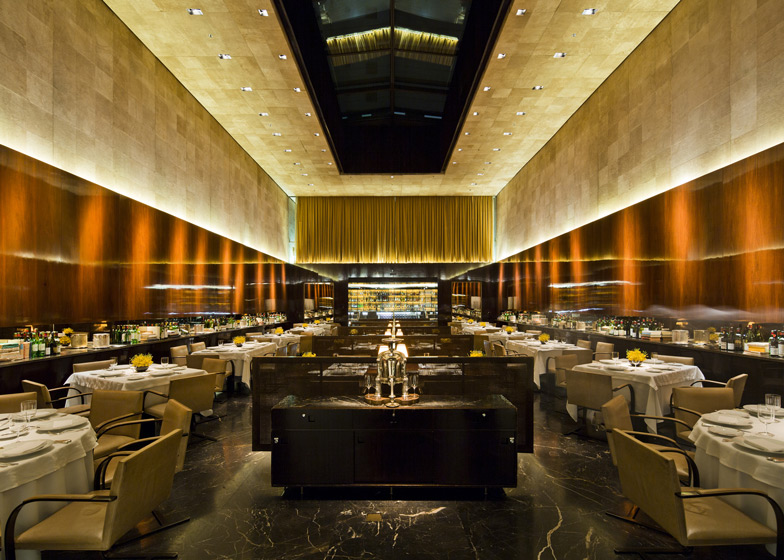Interview: with a new monograph and an exhibition in New York, Brazilian architect Isay Weinfeld talks to Dezeen about his 40-year career, his love of Radiohead, and the buildings he has yet to design (+ slideshow + interview).
"I don't like to look back, to be honest," he told Dezeen, speaking from Espasso Gallery in New York, where the A | Z by Isay Weinfeld exhibition opened last week. "But one of the things that I am very proud of is the wide variety of work."
"I am curious about things, I like to design things I haven't done before," he said. "I would love to design a brothel or a gas station."
Isay Weinfeld is one of Brazil's leading contemporary architects. Born in São Paulo in 1952, he studied at the School of Architecture at the city's Mackenzie University and launched his multidisciplinary practice in 1973.
Working predominantly in his home country, he has designed numerous private residences as well as apartment buildings, hotels, shops, banks and restaurants.
The New York exhibition also marks the launch of a new monograph by Raul A. Barreneche about Weinfeld's commercial projects. However Weinfeld was keen not to present photos or models of his work at the show, explaining: "I am not looking for new clients!"
Instead, the gallery features films of his buildings, plus a cradle and a coffin. "This idea expresses my wish to design from the beginning of life to the end," he says.
The exhibition, A | Z by Isay Weinfeld, is at Espasso, 38 N Moore Street, New York until 1 December. The monograph is published by BEI Editora and is also available through Espasso.
See all our stories about Isay Weinfeld.
Here's an edited transcript of the interview:
Alyn Griffiths: Do you have a particular visual language or material palette?
Isay Weinfeld: No never. I run from belonging to any school or any style, I hate to be labelled, I prefer not to have a style, I am more free. I choose materials according to the project, according to the clients, the country, the project that I am designing and I love all the materials.
Alyn Griffiths: How does it feel to look back over your career?
Isay Weinfeld: I don't like to look back, to be honest. But one of the things that I am very proud of is the wide variety of work. I could never stay designing the same thing in my life or be specialised designing houses or hotels or restaurants. Since the first year I tried not to take jobs that were related to the last one.
I am curious about things, I like to design things I haven't done before, to learn more about it and this is what moved me. I remember one summer a private foundation, a family of art collectors from the south of Brazil, called me to design a very small cultural centre for their foundation. They told me they needed to have a small art gallery inside.
I said I already designed two art galleries, and they also said they needed a bar, and I said I designed some bars already. Then they said they need a restaurant inside, but I already designed this. Then I noticed I know how to manage some of my instruments of work.
Alyn Griffiths: It sounds like you've designed everything!
Isay Weinfeld: No, not yet! I would love to design a brothel or a gas station.
Alyn Griffiths: How do you choose which projects to take on?
Isay Weinfeld: I pay a lot of respect to the people who find my telephone number and ask me to design something. This respect is maybe the most important thing in my relation with my clients. I would never design a house that I want to design, in the way that I want to design. I always try to design a house they want but through my eyes. This is a very subtle difference that is very important to me.
It's very common to hear an architect saying that clients ruin their work and it's never happened [with me] – the client always adds to my work because I always choose them very carefully. I select not because I am arrogant, but because I'm honest. Maybe I'm not the right architect to do your work, maybe I'm not capable.
If you are a good client for me, and I am a good architect for you, we for sure will be happy together. But we need to have respect. The client also adds, mainly in a private house, because it's their house, not my house. The client is giving you an opportunity, so to make your own masterpiece is disrespectful in my opinion.
Alyn Griffiths: Is that an unusual approach?
Isay Weinfeld: Yes, it's a big problem. At least in my profession, it's all about yourself and I am just a servant, I am hired to serve somebody with pleasure.
Alyn Griffiths: Are there any other architects whose work inspires you?
Isay Weinfeld: No. I have three or four architects that I love but I'm not inspired by them. If I love arts and music and theatre, I am much more inspired by the other arts than architecture.
Alyn Griffiths: How do those translate into your work?
Isay Weinfeld: Oh I don't know, I don't know how but it's very clear and very present. Because I see a lot of relation between all this art. One day I designed a disco that was completely dark but very colourful inside. The sink and the restrooms, the tiles, some furniture, the whole thing was black. But certainly we had these colours all over like a rainbow.
Then I heard a track by my favourite band Radiohead called Motion Picture Soundtrack and it was unbelievable – the translation of that work. It was not the music that inspired my work but it was exactly the same, it was music that started completely black and then turned into a rainbow of colours at the end and I put this music in my office for the rest of the team to hear and to see if they felt like me.
I always see relations between all the visual arts – you have now at the Tate Modern a wonderful exhibition by a Brazilian artist called Mira Schendel. She's my favourite artist and she died many years ago but I am always trying to do what she achieved in her life; very strong and minimal work. She is a great influence in my work also.
Alyn Griffiths: What do you think about current contemporary Brazilian culture?
Isay Weinfeld: I think many things are happening but maybe these were happening before. It has waves, I think that the world is paying more attention because now it's Brazil and in a year it'll be the Philippines. But in Brazil, São Paolo is always an energetic city with a very creative feeling, many movements of architecture and music are always booming. I can see, as a Brazilian, many interesting movements, all over Brazil.
Alyn Griffiths: There seems to be a renewed interest in Brazilian architects such as Lina Bo Bardi.
Isay Weinfeld: Yes, it's a pity that people are only now knowing who Lina Bo Bardi is. She is my favourite Brazilian architect and her work is amazing and I am very glad that the world is paying attention to her work. It is a mix of very strong Brazilian soul with pure lines and she worked very intensively in Bahia and with the people of the state. She was Italian and they have a very strong relation with the culture of Brazil.
Alyn Griffiths: There seems to be such a disparity between wealth and poverty in Brazil – can architecture help bridge that gap and address some of the other social issues in Brazil's cities?
Isay Weinfeld: It's difficult, but maybe yes. I don't believe that architecture has this power. We know that very young people are redesigning some very poor villas and I know that the poor people, when they see a new building ready, they want to move to the new one, not because it's new but because it has a better space and a better way to live. This is why I think architecture helps to create better places for people to live in.
Alyn Griffiths: Your 360º Building tries to provide more outdoor space for people in urban areas – how could that be applied to the rest of Brazil's overcrowded cities?
Isay Weinfeld: This is just a small example, we have also the problem with security so it was a way to have your house above in a building, with a garden or a courtyard the same size as the space inside but open and more protected. This is something that is missing in Brazil because of security; to have your own small house with a garden, so this offers an answer to people who want spaces like this.
Alyn Griffiths: Why did you choose to get involved with that project?
Isay Weinfeld: With a building, when you first have some ideas and for commercial business, it's difficult to have a real estate guy with something good in mind that is not just to earn more money. I am working now for a company who think about doing something interesting in the city for people to change the relation with the city again so buildings don't have so many fences, so many guards.
They want this and they are trying to do things better. It moves me to work and to do something that is much more than a private house, where I can interfere in the city and try to make new ways of living and help people live better.
Alyn Griffiths: What else are you working on at the moment?
Isay Weinfeld: I think some eight or ten houses. We are doing more than ten buildings. One is starting now: its a competition that we won in Monaco for a residential building for the Royal family. It was a private competition between ten offices that we won one and a half years ago. They are now starting to build it. Another building in Montevideo in Uruguay, it's also a residential building. Three hotels, one in Brasilia and two in the state of Bahia, one in city of Salvador, the other one in Trancoso.
The client in Brasilia is private client that I designed a house for twelve years ago. They are lawyers but they love architecture. In the city of of Brasilia, it's divided in the main axis of the city, and there's a place just for hotels and they have the last lot for a hotel in Brasilia. They called me to design a huge executive hotel that's very well designed, that we are doing. It's 300 rooms and will be ready next year. There are many other things including two houses in Miami and a house in the Carribbean, and I'm starting something here in New York also.
Alyn Griffiths: Are you involved in any projects related to next year's World Cup?
Isay Weinfeld: No but I'm trying to see my idol Neymar – he's a genius! When he was playing in Brazil, I used to go to Santos where he played. I saw Pele many times in my life but after Pele, this is the guy.
Alyn Griffiths: Tell me about the scope of this exhibition at Espasso in New York.
Isay Weinfeld: I don't know if its an exhibition but its the launch of my new book in New York that is a selection of commercial works. The previous one was just residential and this one is commercial. We have here in New York a big space, to make this launch of the book, they suggested to me to show all forty years of my work, showing photos, drawings, models, everything about my whole life designing. But this is not me in this way and I'm not this kind of guy who wants to come to New York or London to show myself in this very obvious way and I am not looking for new clients! I don't have any interest to show my work like this. Then I decided to think about something more certain and concise about my view of my profession.
So I made a small pavilion with two rooms inside a white box, and it has two pieces inside that express exactly what I think about life and my profession. I designed a cradle made with Brazilian wood and some fabric inside and placed it in a square, completely black room with a very subtle light above it. Then you have a black corridor that opens suddenly to a very bright white room where there is a coffin, using the same fabric as the cradle.
Apart from these exhibits, we are also showing a part of a new project that we are doing, mixing architecture, cinema and music that is my great passion. It's a very short film, about my works, but there's no commentary because it's very short, it's two minutes maximum, showing my view of my works. There are now 40 films ready, there will be between 80 and 100. But we have 40 ready and we are showing 14 of these films on a loop here in the exhibition. This project will launch in December in Brazil and we are also designing an app. Every two weeks it will upload a new film in your iPhone.
Alyn Griffiths: What is the significance of the crib and the coffin in the Espasso gallery?
Isay Weinfeld: I always try to design everything in my profession: if I design a house, I design the interiors, the bell, everything. I see architecture as a whole thing, as if I was an art director. This idea expresses my wish to design from the beginning of life to the end.

